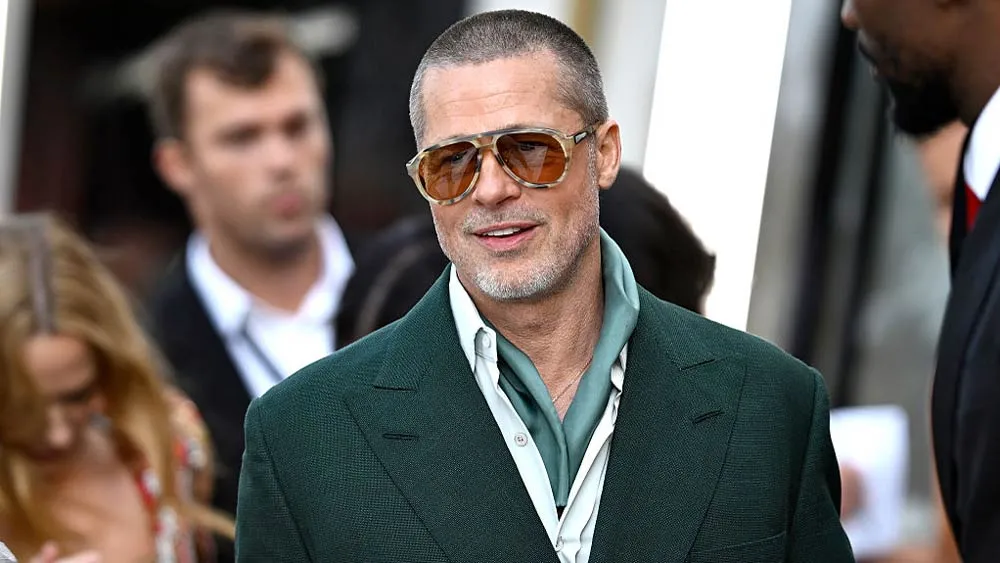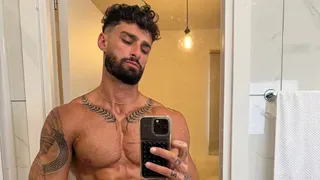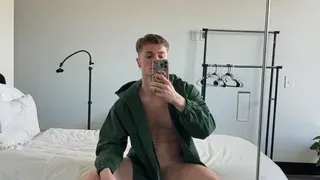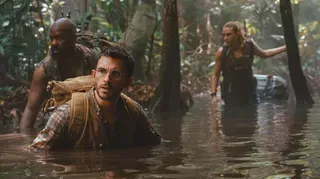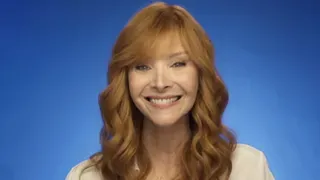February 23, 2011
James Franco :: On Oscars, Mapplethorpe & those pesky gay rumors
Tony Phillips READ TIME: 10 MIN.
A checked-out, distant, but not aloof demeanor: it's what people mean when they say dreamy, but when James Franco enters the room -- or anything, for that matter -- it's with this detached, dreamy sexiness that hangs in the room like cheap cologne.
As he makes his way down the left aisle of the brand-spanking-new basement screening room at that boutique hotel old reliable 60 Thompson, the first thing one notices are the shoes: dirty white sneakers that could have survived Franco's trapped in a cave ordeal chronicled in -- and lasting for -- 127 Hours.
James Franco's footwear was certainly not pulled by Rachel Zoe, or any other stylist, for that matter. They are not the shoes of a movie star, let alone one of this season's best actor Oscar nominees, not to mention the evening's co-master of ceremonies.
Miles to go
They are about nothing if not mileage, and Franco, between lazy cat-like stretches from a high director's chair in the front of the room, gives the impression of a 32-year-old performance artist with miles to go -- however manically -- before he sleeps. And if this matinee idol has clay feet, the rest of him is solid gold shining in the sun.
Before he even answers the first question on a panel, which includes his 127 Hours director Danny Boyle, writer Simon Beaufoy, producer Christian Colson and the man himself, real life caver and author of 127 Hours source material Aron Ralston, Franco demonstrates that his reserves are encyclopedic.
"By the way," Franco tells a beloved junketeer from Boston nicknamed "Clickety-Clacks" because of his penchant for inputing the proceedings directly into his laptop as they are happening, "you were great in Joaquin's documentary."
But before the actor can even get around to answering Clickety-Clack's question about last fall's one-man survey of Franco's highly conceptual, mixed-media fine art at a way off the beaten path gallery in the clock tower of a city-owner building in Lower Manhattan, he pauses for a brief tango with the inquisitor.
Candy-man
Memories of his fever-dream retrospective entitled The Dangerous Book Four Boys include bags passing through an x-ray machine in the lobby to a piece chronicling a love affair between Star Trek's Captain Kirk and Spock.
That gallery floor is, of course, also the scene of last summer's New York Magazine profile of Franco wherein the writer develops a painful crush and uses it to extrapolate the case for James Franco being one of us ("gobble-gobble").
The exhibits for Franco's alleged burgeoning homosexuality are mostly explicated through the work: high profile turns as the titular, young gigolo in Sonny, Harvey's lover in Milk, his career-making, Golden Globe-winning turn in the James Dean television bio-pic.
Then there's last year's portrayal as Allen Ginsberg in Howl as well as his just-wrapped turn as Hart Crane and a rumored, upcoming turn as Robert Mapplethorpe, not to mention his any number of student films -- the UCLA dropout is now an obsessive grad student pursuing multiple degrees at multiple universities simultaneously -- wherein homosexuality figures prominently.
Let's not even get into his Terry Richardson-lensed Candy magazine cover wherein the young actor appears hair slicked back and a face full of blue eye-shadowed makeup that evokes Warhol's garish silk screens of Elizabeth Taylor. "He's got real range, hasn't he? his Academy Award-winning director Boyle asks rhetorically, but it seems to motor well beyond actorly versatility and drill down on a certain topic on which Franco clearly has a lot to say.
Playing Mapplethorpe?
It is a world away -- an almost tectonic career shift -- from the young man who almost choked on his coffee when I asked him back in 2006 if his WWI fighter pilot opus Flyboys was really just a gay love story in Mission Accomplished-drag.
"it seems like that kind of element can be read into any male/male relationship," he finally replied when confronted with whether or not his character and the squadron leader were kicking' it Top Gun style, before rhetorically asking, "are Butch Cassidy and the Sundance Kid homoerotic?"
Well, okay, no. But Milk's beau Scott Smith, Allen Ginsberg, Hart Crane and Robert Mapplethorpe certainly were. A more recent defense of his gay fantasias in Entertainment Weekly is a bit more laid back, but essentially his Butch and Sundance argument redux: "There are lots of other reasons to be interested in gay characters than wanting myself to go out and have sex with guys."
But today, Franco lets his past homo-accolades slide, while addressing the Mapplethorpe rumor directly, packaging it up with more recent gossip that has him cast in Ridley Scott's Alien prequel. "That's weird news, huh?" he asks, "I just heard about it on the internet like yesterday."
Franco, an expert multi-tasker, takes a beat and adds, "Maybe I'll do Mapplethorpe in the Alien movie." It gets a laugh, but then again, so does his saying hello to this rapt audience. The comment suggests that if Franco is our brother, he's one from another planet.
On 127 Hours
Perhaps the peripatetic work ethic is to be admired? Franco describes the 127 Hours script as "like Beckett on speed," but he could just was well be describing himself. When the subject turns to Oscar, that show's longtime, behind-the-scenes scribe Bruce Vilanch remembers Johnny Carson's gag about the "national holiday in Los Angeles." Carson, who hosted the Oscars five times beginning in 1979, was also considered a controversial choice.
Vilanch remembers Carsons' inaugural opening, "Welcome to two hours of sparkling entertainment spread out over a four-hour show" as a half hour spread out of three hours, but on this year's new co-hosts, Franco and Ann Hathway, Vilanch is crystal clear. "The new hosts are movie stars, " he says, "they don't have to come out and kill."
Perhaps, or maybe they just won't be licensed. Franco has already gone public about the Academy nixing his hysterical, tone-deaf rendition of Cher's "You Haven't Seen The Last of Me" from the year's biggest snub: Burlesque.
"You know what?" Franco asked in a recent issue of Vanity Fair, "if it's the worst Oscars show ever, who cares? It's fine, it's like one night. So, it doesn't matter. If I host the worst Oscars show in the history of the Oscars, why do I care? I'll try my best, but I don't see any shame."
This new, shame-free Franco, with all its train wreck possibility, is also unleashing some of the actor's finest work. Take his double-duty, Best Actor nod at this year's Academy Awards. It could be the actor's just tapping into better source material. He recounts first meeting Ralston at the Four Season's in Los Angeles where Ralston tromped in with "this ratty VHS tape that had the original videos on it. We all sat there and watched it."
A man facing death
Those videos, shot while Ralston's arm was pinned by a boulder at the bottom of an isolated ravine in Utah for the titular time-frame 127 hours, form the basis for Ralston's book about the ordeal entitled Between a Rock and Hard Place. Ralston has never made the videos public, but they are recreated in the film. Franco elucidates their power thusly, "Here's a guy that thinks he's gonna die, and in some ways, he's accepted it."
"Every other iteration of the story that you hear from now on," Franco continues, "you know that Aron made it out. And Aron can tell the story and we can tell the story, but you know, kind of, what happens. On the video, it's Aron in the middle of the situation, not knowing that he's gonna get out." And so while Franco may not be licensed to kill, he is perhaps unafraid to die?
The actor stops short of that type of extrapolation. When asked if he has his own, personal 127 Hours-like ordeal, he just shakes his head. Finally, he says, "I've been lost. I got lost in Paris. I had to find a taxi and there aren't taxis at a certain hour, and it was really hard."
When pressed for his take-away from the film, he says simply, "If I hike, I'll be sure to tell people where I go." When the laughter subsides, he continues, "It's given me an appreciation for my life, for the people in my life, certainly."
"I always saw this," he continues, "and we had a discussion in that first meeting. Aron asked me why I wanted to play this role, and I still believe this, I love the way that it strips down this character and this person. Everything that is familiar in our day to day lives with other people, that we can get food from a restaurant or a store--just emotional dependence--everything that is familiar to us.
"And also," he adds, "just the daily activities that keep us from looking at ourselves, you know, in a very intimate way, all of that is taken away and it's a man alone. And it's a man facing death. And so, I imagined that what we had was a real way to just study what it is to be human, what's important in our lives, what we hold onto from our outside life. And then, what pulls us out, and what really gives us strength."
His own book
Franco again stops short of comparing his own book -- yes, the actor is also a published author with last year's collection of short stories which takes its title from the place he's from: Palo Alto -- to Ralston's own book.
In a surprised, but favorable review of Palo Alto, Joshua Mohr writes in the New York Times, "Many of the stories end in nihilistic violence and gratuitous gore, which, let's admit, can be entertaining. Oscillating angst is acted out in car accidents, fistfights, petty felonies and empty threats lobbed at drug dealers."
"My book is very different than Aron's," Franco says. "His is based on Aron's experience, and then, I guess research that he did about the area and everything else. And it's non-fiction. It's, in a lotta ways, a very different animal and it had different intentions than I have with my books." He pulls his beat-up motorcycle forward and you can hear the leather creaking in the silence that follows.
"But I do think there's some similarities," Ralston pipes up. "Something between us, perhaps from a personality standpoint, did lend something beyond just an actor portraying a person. We haven't talked about this, but there are some similarities between us. I think both our tendencies for ambitious, multi-faceted endeavors, projects and experience is very stimulating. I mean, just kind of being overextended."
He takes a pause, and then continues, "Or, well, for me it was being overextended. James seems to have some sense--some resources internally -- that... I'm impressed. Like all these master's programs that he was studying for, and even reading scripts on the set and doing this work that I was like, 'Wow, so you like to be busy, huh?'"
"And he's like, 'Yeah, I like to be busy,'" Ralston continues. "And I was like, 'Me too!' So there's some connection, I think, in a sense of personality. Maybe it gave James a little bit more access to me to put on the screen so that when my family and my friends see this film, as they have, every single one of them sees something at some point in the film where they're like, 'That's so you, Aron.'"
"Yeah," Franco agrees, "I would say that we thought we could serve the story best with like an inside-out approach. And I always had faith, you know, as an actor, that if you do a lot of work beforehand, and then proceed in a certain way so that you're generating the performance from inside out, that actually, you will hit the right beats on the outside."
Tony Phillips covers the arts for The Village Voice, Frontiers and The Advocate. He's also the proud parent of a new website: spookyelectricproductions.com.
